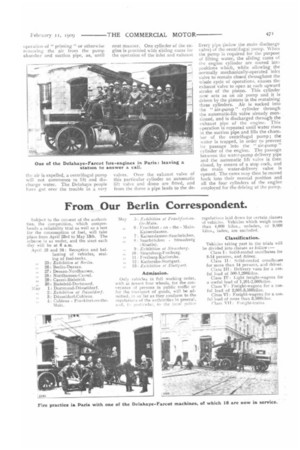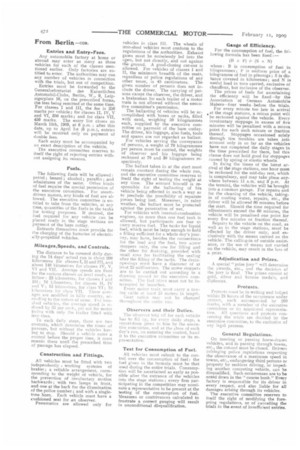From Our Berlin Correspondent.
Page 15

Page 16

If you've noticed an error in this article please click here to report it so we can fix it.
Subject to the consent of the authorities, the competition, which comprehends a reliability trial as well as a test for the consumption of fuel, will take place front April 23rd to May 13th. The scheme is as under, and the start each day will be at 6 a.m.
April 23 and 24: Reception and ballasting of vehicles, sealing of fuel-tanks.
25: Exhibition at Berlin.
26: Berlin-Dessau.
27: Dessau-Nordhausen.
28: Nordhausen-Cassel.
29; Cassel-Bielefeld.
30; 13ielefeld-Dortmund. 1; Dortmund•Diisseldorf. 2: Exhibition at Dusseldorf. 3; Dasseldorf-Coblenz. 4: Coblenz Frankfort-on-theMain.
May 3 : Exhibition at Frankfort-on
the-Main.
6: Frankfort on • the MainKaiserslauten.
7: Kaiserslauten-Saarbracken. Saarbrucken . Strassburg iAlsatia).
9 : Exhibition at Strassburg.
10: Strassburg-Freiburg.
It: Freiburg-Karlsruhe.
12: Karlsruhe-Stuttgart.
13 : Exhibition at Stuttgart.
Admission.
Only vehicles in full working order, with at fewest four wheels, for the conveyance of persons in public traffic or for the transport of goods, will be admitted, in so far as they conform to the regulations of the authorities in general,
i71 ilarticillar, to the local polics?
regulations laid clown for certain classes of vehicles. Vehicles which weigh more than 4,000 kilos., unladen, or 9,000 kilos., laden, are excluded.
Classification.
Vehicles taking part in the trials will be divided iato classes as follow:— Class I: Solid-roofed omnibuses for 8-14 persons, and driver.
Class II: Solid-roofed omnibuses for more than 14 persons, and driver.
Class III : Delivery vans for a useful load of 500-1,200kilos.
Class IV: Light freight-wagons for a useful load of 1,201-2,000kilos.
Class V: Freight-wagons for a useful load of 2,001-3,500kilos.
Class VI: Freight-wagons for a useful load of more than 3,500kilos. Class VII : Freight-trains. Any automobile factory at home or abroad may enter as many as three vehicles for each of the classes mentioned earlier. Only factories are entitled to enter. The authorities may run any number of vehicles in connection with the trials, but out of competition.
Entries must be forwarded to the Generalsekretariat des Kaiserlichen Automobil-Clubs, Berlin, W., 9, Leipzigerplatz 16, on the prescribed forms, the fees being remitted at the same time. For classes I and III, the fee is 250 marks per vehicle; for classes II, IV, V and VI, 350 marks ; and for class VII, 450 marks. The entry list closes on March 15th, 1909, at 6 p.m. ; after this date, up to April 1st (6 p.m.), entries will be received only on payment of double fees.
Each entry must be accompanied by an exact description of the vehicle.
The executive committee reserves to itself the right of rejecting entries without assigning its reasons.
Fuels.
The following fuels will be allowed : petrol ; benzol; alcohol ; paraffin ; and admixtures of the same. Other kinds of fuel require the special permission of the executive committee. For steamdriven motors, any kinds of fuel are allowed. The executive committee is entitled to take from the vehicles, at any time, quantities of the fuels in the tanks for testing purposes. If desired, the fuel required for any vehicle can be placed ready in the stage stations on payment of the bare outlay.
Entrants themselves must provide for the charging of the batteries of electrically-propelled vehicles.
Mileages,Speeds, and Controls.
The distance to he covered daily during the 14 days' actual run is about 200 kilometres for classes I, II and ITT, and about 140 kilometres for classes IV, V. VT and VII. Average speeds are fixed for the various classes on level roads, as follow : 25 kilometres, for classes I and Ill ; 18 kilometres, for classes II, IV and V ; 15 kilometres. for class VI; 12 kilometres for class VII. These averages are modified in hilly country, ac. cording to the nature of same. For ironshod vehicles, the average speed is reduced by 25 per cent, yet not for motor trains with only the trailer fitted with iron tires.
To each daily stage, there are two controls, which determine the times of passage, but without the vehicles having to stop. Should a vehicle enter a control before the proper time, it must remain there until the prescribed time of passage has elapsed.
Construction and Fittings.
All vehicles must be fitted with two independently working systems of brakes; a reliable arrangement, corresponding to the weight of vehicle, for the prevention of involuntary motion backwards ; with two lamps in front, and one at the back for the illumination of the police number ; and with a single. tone horn. Each vehicle must have a cushioned seat for an observer.
Pneumatics are allowed only for vehicles in class III. The wheels of iron-shod vehicles must conform to the regulations of the authorities. Exhaust gases must be noiselessly led into the open, but not directly, and not against the ground. A good-closing cut-out is allowed. For vehicles of classes I and II, the minimum breadth of the seats, regardless of police regulations of any other tenor, is 45 centimetres. The given number of persons does not include the driver. The carrying of persons except the observer, the driver, and a brakesman for each trailer of a motor train is not allowed without the executive committee's permission.
The ballasting of vehicles will be accomplished with boxes or sacks, filled with sand, weighing 50 kilogrammes each, supplied by the executive committee on payment of the bare outlay. The driver, his luggage, also fuels, tools and spares are not regarded as ballast.
For vehicles serving the conveyance of persons, a weight of 70 kilogrammes per person roust be carried, the weights of observer and his luggage being. reckoned at 70 and 30 kilogrammes respectively.
The ballast taken in at the start must remain constant during the whole run, and the executive committee reserves to itself the right of testing the weight at any time. The entrant himself is responsible for the ballasting of his vehicle being effected in such a way as to preclude the possibility of separate pieces being lost. Moreover, in rainy weather, the ballast must be protected against the penetration of wet.
For vehicles with internal-combustion engines, no more than one fuel tank is allowed, but participants are free to carry reserve fuel. The tanks for liquid fuel, which must be large enough to hold a filling sufficient for a whole day's journey, may have, besides the connections for the lead and the fuel, two screw stoppers only, the one for filling and the other for draining, provided with small eyes for facilitating the. sealing after the filling of the tanks. The drainopenings must have a diameter of at least 25 millimetres. The screw stoppers are to be carried out according to a drawing passed by the executive committee. The fuel pipes must not be interrupted by branches.
Every motor train must carry a towing cahle at leiv4 2.5 metres in length.
Gear ratios may not be changed ilirougli,mt the rutire rum Observers and their Duties.
The observer told off for each vehicle has to fill up, for every daily stage, a report.form given to hint by the executive committee, and at the close of each day's run, on entering the control, hand it to the executive committee or its representative.
Test for Consumption of Fuel.
All vehicles must submit to the control over the consumption of fuel : the fuel given in the formula must be that used during the entire trials. Consumption will be ascertained as early as possible after the entrance of the vehicles into the stage stations ; every firm participating in the competition may nominate a representative to be present at the testing of the consumption of fuel. Measures or contrivances calculated to frustrate a correct gauging will result in unconditional disqualification.
Gauge of Efficiency.
For the consumption of fuel, the following formula has been fixed :— (B x P) (S x where : B is consumption of fuel in kilogrammes ; P is uniform price of a kilogramme of fuel in pfennigs ; S is distance covered in kilometres; and N is useful load in tons carried, exclusive of chauffeur, but inclusive of the observer.
The prices of fuels for ascertaining the efficiency will be fixed —by the Association of German Automobile Makers—four weeks ,before the trials.
For every minute too late in arrival • at the stage stations, a minus point will be reckoned against the vehicle. Every involuntary stoppage in excess of five minutes will be penalised with a minus point for each such minute or fraction thereof. Stoppages occasioned solely through tire troubles are taken into account only in so far as the vehicles have not completed the daily stages in the time prescribed for them, but this clause does not hold good for stoppages caused by spring or elastic wheels.
In fixing the times of the latest arrival at the stage stations, one hour must be reckoned for the mid-day rest, which is compulsory, and may take place anywhere between 11 a.m. and 3 p.m. At the termini, the vehicles will be brought into a common garage. For repairs and for the cleaning of the vehicle, taking. in of cooling water, repairs, etc., the driver will be allowed (10 minutes before the start. Should the time required for adjustments exceed the 61) minutes, the vehicle will be penalised one point for every five minutes or fraction thereof.
Repairs to the vehicle on the road, as well as in the stage stations, must be effected by the driver only, and exclusively with the means carried on the vehicle. The calling-in of outside assist. ance, or the use of means not carried on the vehicle, may result in the loss of a prize.
Adjudication and Prizes.
A special "prize jury" will determine the awards, etc., and the decision of the jury is final. The prizes consist of gold, silver and bronze medals, and diplomas.
Protests.
Protects must be in writing and lodged within 24 hours of the occurrence under protest, each accompanied by 200 marks, with a member 01 the executive committee or its appointed representative. All questions and protests concerning the trials are decided by the executive committee, to the exclusion of any legal. process.
General Regulations.
On meeting or passing horse-drawn vehicles, and in passing through towns, etc., the cut-out must be closed. Drivers infringing police regulations respecting the observance of a maximum speed in towns, etc., endangering third persons or property by reckless driving, or impeding another competing vehicle, can be disqualified. Such occurrences are to be noted down in the " course book." Every factory is responsible for its driver in every respect, and also liable for all damages arising through its vehicles.
The executive committee reserves to itself the right of modifying the foregoing regulations, or of cancelling the trials in the event of insufficient entries.






















